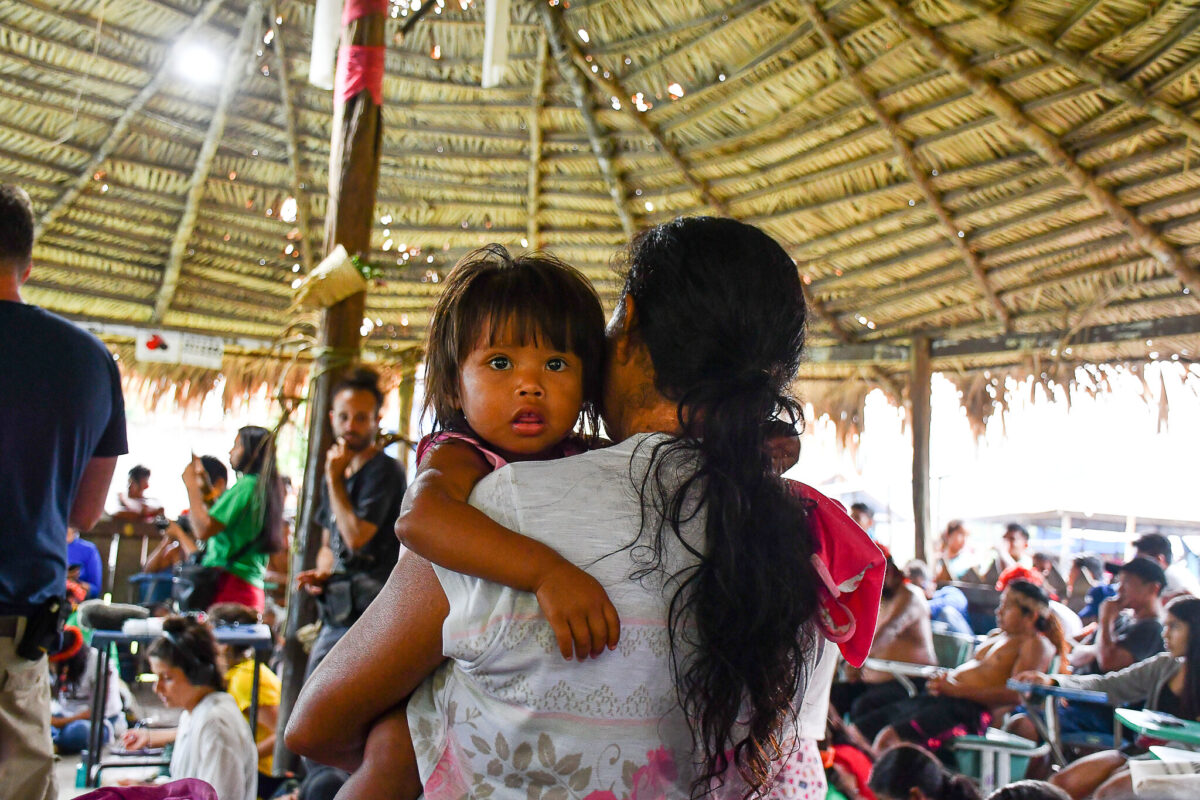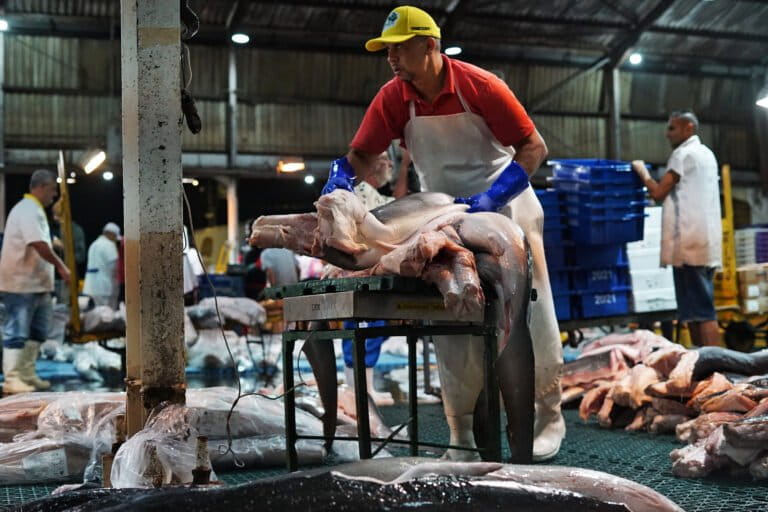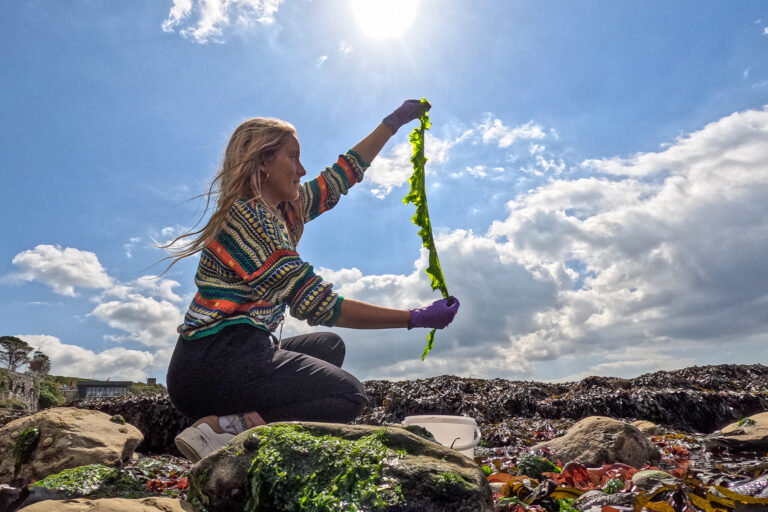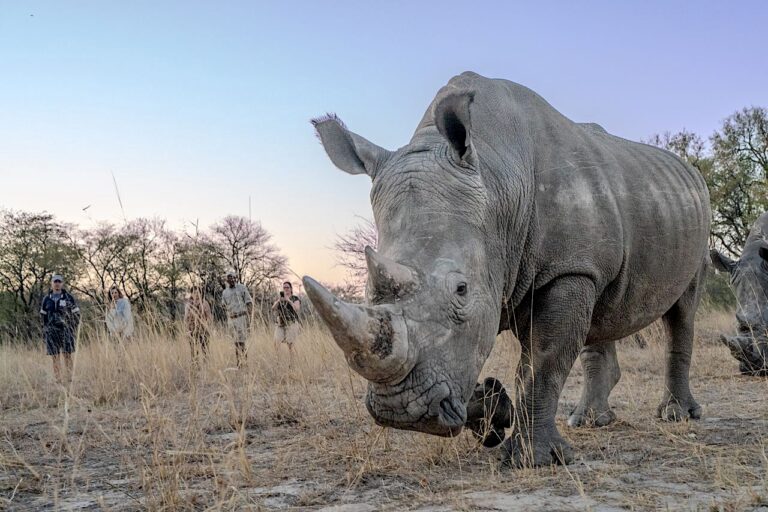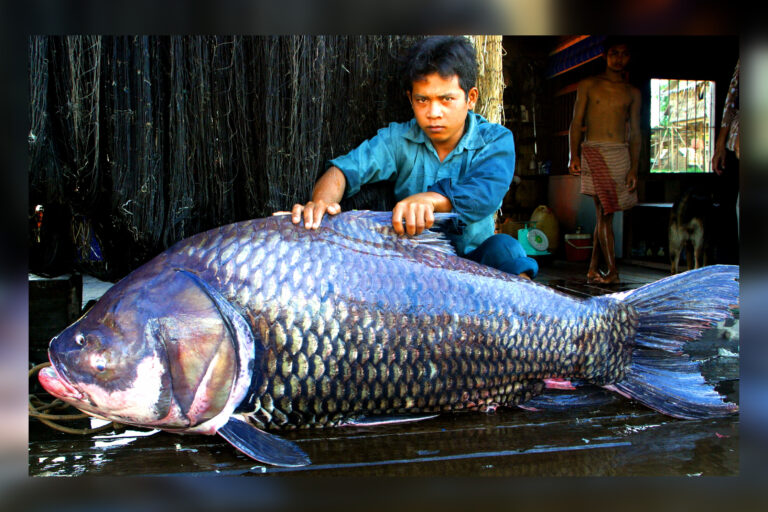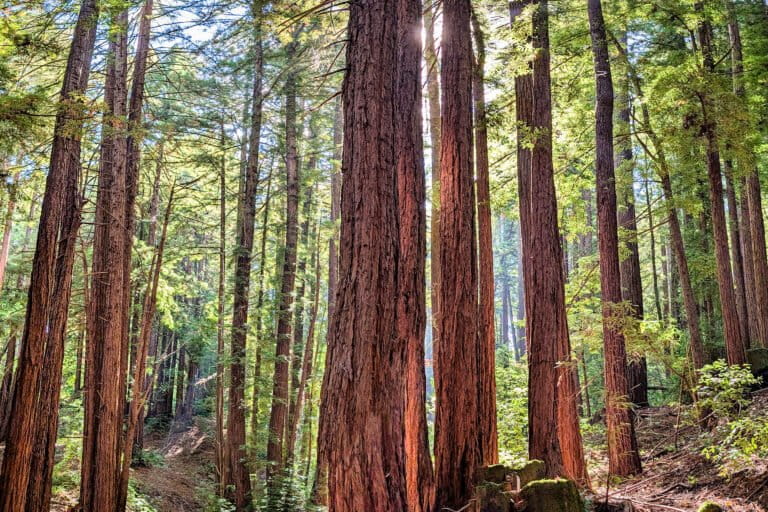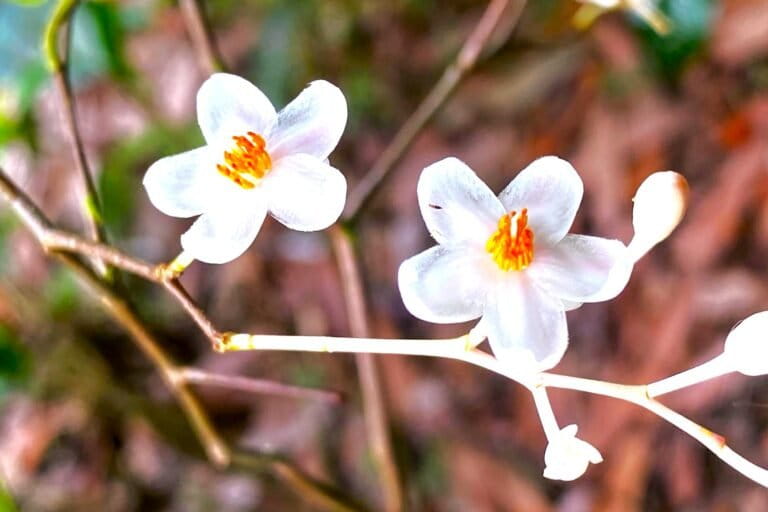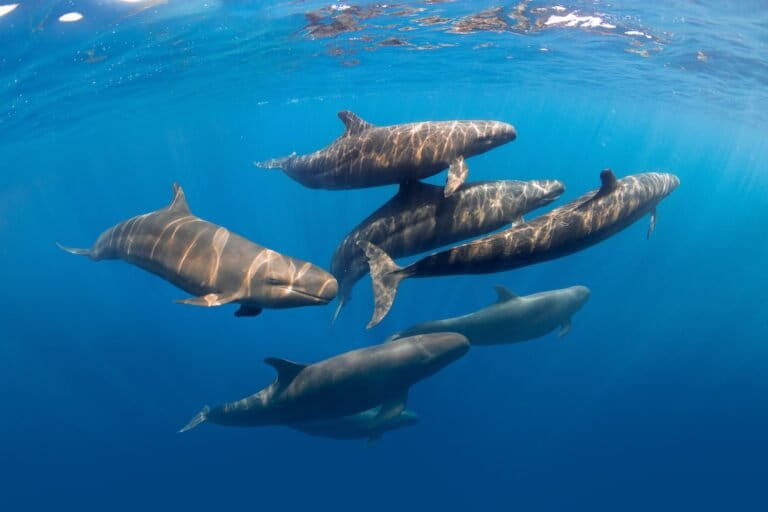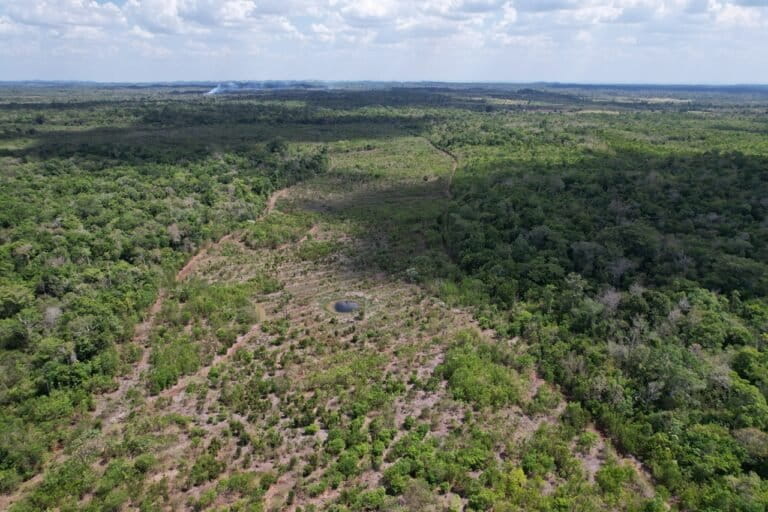- The new book Seremos Jaguares (We Will Be Jaguars) by Indigenous leader Nemonte Nenquimo is the memoir of a woman who fought against large oil companies to preserve her people’s land and thousands of hectares of Amazon rainforest.
- The book, written with her husband and executive director of the organization Amazon Frontlines, Mitch Anderson, is a story of hope and resistance from the Amazon in the fight against climate change and the protection of nature.
- In this interview, Mongabay speaks with Nemonte Nenquimo about her work to defend the Amazon and what her new book symbolizes for Indigenous women around the world.
At just six years old, Nemonte Nenquimo understood that there were two worlds. The first one was where her oko (a big house where she lived in the rainforest) existed. This world was lit by fire, and was where her family called her by her name, Nemonte, meaning “many stars.” The other world was where white men from an oil company watched her people from the sky in large airplanes and threatened their territory. It was also a world where evangelical missionaries called her “Inés.”
Seremos Jaguares (We Will Be Jaguars) is the new book in which Indigenous leader Nenquimo narrates her memories and her campaign against oil companies in Waorani territory in Ecuador. Her struggle was born from efforts to conserve thousands of hectares of rainforest and biodiversity. The book, released this September, was co-authored by Mitch Anderson, executive director and co-founder of Amazon Frontlines. Anderson is also Nenquimo’s husband, with whom she has two young children.

“Our God, who gives us visions, is the jaguar. And when you die, you become one,” says the Waorani leader. “When we die, we’ll continue to live on in a spiritual sense, and we’ll continue to protect our territory, the land, and nature. I’m very happy about that because when I die someday, I’ll continue to be alive, traveling and caring for the land,” she says in a discussion about the title of her book.
Two decades after breaking from a religious group, Nenquimo has become one of the strongest activist voices on climate change. She has led the alliance of various Indigenous peoples in the Amazon, achieving, in the words of the Waorani people, “a historic victory against big oil companies,” following a legal process that suspended exploitation that was planned to take place within her community.
On September 5, 2024, the International Day of Indigenous Women, Mongabay Latam spoke with Nenquimo about her work to defend the Amazon and what her new book symbolizes for Indigenous women around the world.

Mongabay: The book will be published under two names: Seremos Jaguares in the United States and Latin America, and No Seremos Salvados (We Will Not Be Saved) in the United Kingdom. Why was a different title chosen for the United Kingdom?
Nemonte Nenquimo: No Seremos Salvados was chosen because, many times, people from other parts of the world turn up in our Indigenous territories “to save” us. They come with their offers, with these very nice words, but they don’t do any good. They speak about salvation, but all they really do is harm. My people, my village, my grandparents, my father were all contacted by evangelical missionaries [from the United States]. They, too, spoke about salvation and hell, and everyone was scared. The consequences were illness and death, and destruction caused by the oil company.
Many young people in Europe were concerned by this title and asked me whether they would be saved. And I told them, no, not if we aren’t respecting Mother Nature. The rainforest gives life and balance to the planet, so we have a connection to it. I realize that people outside are disconnected from the spiritual world and Mother Nature, but Indigenous people’s worlds are disconnected, too. When oil tankers, highways, invasions, and deforestation arrive, this disconnects Indigenous peoples from their roots and traditional knowledge.
These are two things I try to address in the book. I’m not just talking about white people, but about two things that we need to understand and respect about each other: our cultures and our worldviews.

Mongabay: In your book, you argue that stories are sacred living beings for the Waorani people. What do you mean by that?
Nemonte Nenquimo: Our ancestors have told stories orally for thousands of years because Waorani people are not writers. Even now, we’re still living as oral beings: our parents, mothers, grandparents, aunts, and uncles continue to tell stories orally every day. In my opinion, if you don’t pass history on, it dies. My grandfather told stories about my great-grandfather, my father continues to tell all those stories and now I’m telling them to my daughter. That’s living history.
When we started writing my book, I first told it orally. My husband wrote everything down in his notebook and recorded it on his cell phone, but not like an anthropologist who visits us for a few months or asks questions all day and then finishes. In Waorani culture, that doesn’t happen. Our culture is very different because every day is lived differently: with joy, movement, animals, and plants in connection with rain and storms.
I hope that people read the book and let it live freely. I hope that it can travel around the world and particularly empower women. And not just help Indigenous women have a voice and be brave, but all women.

Mongabay: How was the process of writing the book with Mitch Anderson?
Nemonte Nenquimo: I’m very grateful to my husband because he lived in my territory and worked with my father for many years. He was at the bonfires, and he knew what the younger me was like, what she ate, how she made things, and what she loved.
Writing the book was intense work, and there was great respect and honesty. I remembered my childhood memories, and they brought me so much joy. Many memories aren’t included in the book because they popped into my mind like bubbles, as if I were full of stars, and Mitch had to catch them and note them down before he could catch another. There was so much that didn’t make it into this book.
The story is told so beautifully and I feel very proud because it’s the first book to tell my story and include the struggle of my people — a story that was often told by missionaries and other people who lived there for a while. It’s so beautiful to understand the deep spiritual connection with Mother Nature and how we interact as people, in a very close way with the Earth, with animals, and with all that is sacred.

It was very important for me that Mitch understood life in the rainforest and also that he knew who I was. He comes from a capitalist world, and I’m a woman from the rainforest. My people were contacted just 50 years ago. The Waorani are one of the latest people to be contacted in Ecuador, which was something important to tell.
We’re both working to defend the territory, to defend culture and knowledge. Mitch wasn’t like the missionaries who came to impose the idea of colonization or the church, he came to truly understand. I’m growing in my leadership, and I need to share who I am, who my people are, and why we’re fighting.

Mongabay: You used to be part of an evangelical mission. What led you to leave the religion and begin your journey to defend the Waorani people’s territory?
Nemonte Nenquimo: I lived outside of the territory, in Quito, for two or three years. When I returned to my territory to connect with my family, I was very embarrassed because they had their own knowledge, and I came dressed differently, wanting to teach them about the Bible. They made fun of me. My aunts said to me, “You’re the granddaughter of Piyemo and Wemonca, and you’re coming here pushing this foreign culture?”
After spending some more time in the rainforest, I knew that I was lost, that I was wrong, confused.
I thought that if I was confused, many other people of my generation might be too. And that we could lose our wealth, culture, values, knowledge, lands, and rivers. I felt as though I wasn’t doing any real good because my aunt was making fun of me, saying things like, “Who are you? What family are you from? What blood runs through you? You should be making chica (purple corn liquor), you should be singing and healing with leaves.” My aunt’s words hurt me a lot. I didn’t feel proud to say that I was the first of them to speak Spanish very well or who wore those other clothes. That’s when I realized that I was doing the same thing as missionaries by pressuring them and making my own culture disappear.
But I was brave enough to tell myself to wake up. I decided to return to my territory and become a teacher so that I could understand this world alongside the children there. The children who live in the rainforest are open-eyed, open-minded, and very intelligent — they climb, run, bathe, swim, and interact with animals. The outside world, however, is constrained by fear — adults tell children that the Earth can make them dirty, but the children of my community bathe naked and fall around in the mud. That’s how I grew up.

Mongabay: How did the fight to prevent oil companies from entering the Waorani people’s territory begin?
Nemonte Nenquimo: I wanted to be a teacher in my territory but they sent me to another Waorani territory, where there was an oil company. This pained my soul. For the first time, I realized how companies come to dominate and how they come to treat my people, my village, with violence. My grandparents and my people were right. Mother Earth provides us with everything: food, culture, and knowledge. We live in peace and as a group, but the other world makes us more individualistic.
When I met Mitch in 2013 and he invited me to travel with the Cofán community [another Indigenous group in Ecuador], I became really angry, angrier than I had ever been in my life. My friend Emergildo Criollo’s children died drinking oil. Then, there was another huge spill, and the women washed and bathed there. What did the Chinese oil companies do? They brought them tuna and sugar so they wouldn’t talk to the press. They hid everything, and that made me even angrier. I said, “What am I doing here with my hands behind my back? If I don’t do anything, the same thing that has happened in the north to the Cofán communities will happen in my Waorani community in Pastaza.” Our water, the environment, and culture will be contaminated, and we will be lost and homeless.
We must not allow the oil companies and the world of colonization to come and mock and humiliate us, to give us crumbs. Because they take away all and extract all the wealth, and we are left as beggars. I returned to my territory thinking something new: that I had a mission.


Mongabay: How did you begin to ally yourself with other people and communities?
Nemonte Nenquimo: I built strength by joining other minority groups as part of a strategy to invite my people from Pastaza to see what happened to the Cofán community. This community, like us, had great wealth, which was depleted by the invasion of the oil company. Now, they live on tuna and rice.
It was a big moment for me to mobilize my people and create a non-profit organization. The dream was to know what we wanted for the future, and I realized that my ancestors were wiser than I was. My grandfather was right about defending and caring for the land; they were nomads who feared losing their territory. But in the process, I was afraid. I kept thinking: “Will I be a leader or not? Will I succeed?” But I knew that these thoughts had to be stopped, like a wall.
And that was it, we had achieved our goal. We formed Alianza Ceibo [Ceibo Alliance] and won against oil the oil company. [In 2019, Nenquimo led the legal action against the Ecuadorian government for violating the Waorani people of Pastaza’s right to a free, prior, and informed consultation for the exploitation plan of Block 22.]
![Amazon Frontlines co-founders Mitch Anderson and Nemonte Nenquimo (center) with partners from the Indigenous organization Alianza Ceibo [Ceibo Alliance].](https://imgs.mongabay.com/wp-content/uploads/sites/20/2024/10/07095546/Amazon-Frontlines-co-founders-Mitch-Anderson-and-Nemonte-Nenquimo.jpg)
Mongabay: A year ago, Indigenous peoples and Ecuadorian citizens said “yes” in a referendum on whether to expel oil companies from Yasuní National Park. But this expulsion still hasn’t been implemented. What are your demands on this issue?
Nemonte Nenquimo: All Ecuadorians, Indigenous peoples, activists, filmmakers, students, and society in general were united — we campaigned for a “yes to life” to win. So, the will of the Ecuadorian people must be fulfilled. President Daniel Noboa said that when he became president, he would respect it, and that he wouldn’t permit any more exploitations in the Yasuní-Ishpingo Tambococha Tiputini. During the campaign, he was very nice, but he’s not doing anything to make the oil companies dismantle their tools and leave.
Now, we hear that they should stay, that it will be a process. The president does not respect the Ecuadorian people’s decision. Instead, he wants to invest in companies and mining, which destroys the environment, rivers, and the entire Amazon. He has the opportunity as president, as a young man, to think and develop a plan, a different proposal as a leader, because in the end, oil will not help sustain the country’s economy in the long term — oil will run out.
Production must stop, and there must be another type of economy and investment in conservation. He must think about the future, not just about what will benefit Ecuador but the world. We’ve already seen that 50 years of oil operations have not been an economic solution. In fact, they have only resulted in more massacres.
I’m not very political, but as an Indigenous woman and a leader, I think we have a dream: that in the future, all this diversity will continue to live — it mustn’t be destroyed or disappear. We Indigenous peoples will continue to demand this from the government. Amazonian countries are united in this. The government promised to respect the people’s will, but it isn’t. Exploitation in the Yasuní oil block must be suspended now.

Mongabay: Amazonian women from Ecuador have played a very important role in defending nature. What does this book mean to all of them?
Nemonte Nenquimo: I think this book is very important because Indigenous women in the Amazon must be empowered. They must make decisions and not be silent — they must speak out to the world. Women who aren’t from the Amazon must also be brave and speak out. Wherever we are, we must join forces and come together to figure out what’s best and to make the best decisions for the future. If we don’t do this and assume responsibility, we’ll continue with the same outlook, leading us to the brink of destruction worldwide.
This book was written by an Indigenous woman based on her own experience, hope, and efforts to defend and protect the Amazon. It can be an example for all women to follow, with a different perspective to achieve change in this world for future generations.

Mongabay: What do you think the future holds for the Amazon and the campaign against climate change?
Nemonte Nenquimo: People from outside [the Amazon] must make decisions and take action, not just listen and hear about what’s affecting the Amazon. Taking action means no longer consuming or investing in what’s harming the land. This is not just Indigenous peoples’ work. It’s not about thinking that only those far away in the Amazon are affected and that others aren’t because we’re all connected to the rainforest. We have to raise awareness, find resources to conserve nature and protect those who continue to resist in communities: the leaders. We must form a united front, a single cause for human beings’ lives, and stop climate change.
Indigenous people aren’t making the decisions at conferences and meetings. We’re invited like clowns to “represent,” but the decisions are made by white people, the same politicians who want to generate more oil and approve more mining. I don’t agree with this. We must enable Indigenous people and non-Indigenous people to make decisions together in order to bring about real changes.
It will never happen if we wait for the government and politicians to make a change. My experience of leadership is raising awareness among civil society. We shouldn’t wait for the government to dictate to us and make the decisions about our futures. Rather, as women, young people, leaders, and mothers, we must form a community, unite, and have hope of changing the world.
Banner image: Waorani leader Nemonte Nenquimo during a canoe trip on the Curaray River in her ancestral territory in the Ecuadorian Amazon. Image by Nico Kingman (Amazon Frontlines).
This article was first published here on Mongabay Latam on Sep. 5, 2024.
Ecuador’s consultation process for Indigenous lands comes under the microscope
FEEDBACK: Use this form to send a message to the author of this post. If you want to post a public comment, you can do that at the bottom of the page.




